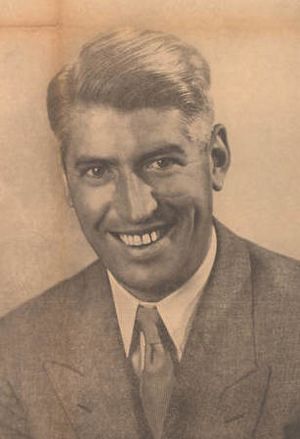Fritz Hellwig facts for kids
Quick facts for kids
Fritz Hellwig
|
|
|---|---|
 |
|
| European Commissioner for Research, Technology and Information Distribution | |
| In office 2 July 1967 – 30 June 1970 |
|
| President | Jean Rey |
| Preceded by | Position established |
| Succeeded by | Ralf Dahrendorf (Research, Science and Education) Altiero Spinelli (Industry and Technology) |
| Personal details | |
| Born | 3 August 1912 Saarbrücken, Prussia (now Germany) |
| Died | 22 July 2017 (aged 104) |
| Political party | Christian Democratic Union |
| Alma mater | University of Marburg University of Vienna University of Berlin |
Fritz Hellwig (born August 3, 1912 – died July 22, 2017) was an important German politician. He was a member of the CDU party. He also served as a European Commissioner, which is a high-ranking official in the European Union.
Hellwig was born in Saarbrücken, Germany. He lived a very long life, reaching the age of 104. He passed away just before his 105th birthday.
Contents
Early Life and Studies
Fritz Hellwig was born in an area now called the Saarland province in Germany. Back then, it was part of Prussia. After finishing school in Saarbrücken in 1930, he went to university.
He studied many subjects, including philosophy, economics, political science, and history. He attended universities in Marburg, Vienna, and Berlin. In 1933, he earned his doctorate degree in Berlin. His research was about the history of the Saar region. In 1936, he completed another important study on a local industrialist.
From 1933 to 1939, Hellwig worked at the Saarbrücken Chamber of Commerce and Industry. This organization helps businesses in the region. He also taught at a teacher training university in Saarbrücken starting in 1937.
Later, from 1939 to 1943, he managed parts of the iron and steel industry. He then served in the armed forces from 1943 until 1947. After leaving the army, Hellwig became an economic adviser. He worked in cities like Düsseldorf and Duisburg.
From 1951 to 1959, he was a director at the German Industrial Institute in Cologne. He also led the "German Saarbundes." His ideas greatly influenced how Chancellor Konrad Adenauer handled policies for the Saar region.
Joining Political Parties
Fritz Hellwig first belonged to the Centre Party. However, in 1947, he joined the CDU party. He quickly became involved in the CDU's economic committee for the Rhineland area.
He was also chosen for the federal committee for economic policy. Hellwig helped write the "Düsseldorfer Leitsätze" in 1949. These were important guiding principles for the CDU party.
Working as a Public Representative
From 1953 to 1959, Hellwig represented the Cologne II area in the Bundestag. The Bundestag is the German parliament. From 1956, he led the Bundestag committee that focused on economic policy.
Hellwig also worked on an international level. From 1953 to 1956, he was a deputy delegate for the Council of Europe. This organization promotes cooperation among European countries. He was also a member of the early European Parliament in 1959.
Serving in European Public Office
Fritz Hellwig left the Bundestag to take on a new role in Europe. He became a member of the High Authority of the European Coal and Steel Community. This was an important organization that helped manage coal and steel production in Europe. It was one of the first steps towards the modern European Union.
In 1967, this organization merged with the Commission of the European Economic Community. Hellwig then became a Vice-President of the new Rey Commission. He also served as the European Commissioner for Science & Research. In this role, he helped guide research and technology efforts across Europe.
 | Mary Eliza Mahoney |
 | Susie King Taylor |
 | Ida Gray |
 | Eliza Ann Grier |

